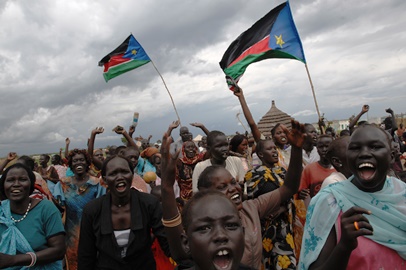South Sudan rejects holding unilateral referendum vote on Abyei
October 23, 2013 (JUBA) – South Sudan said on Wednesday that it does not support the conduct of a unilateral referendum to determine the final status of the oil-contested border region of Abyei, questioning what its outcome would achieve if it is not recognised by either country.

Speaking to journalists at a press conference, Lueth questioned how a unilateral vote could help break the deadlock over the future of Abyei if the result was not formally recognised by either Sudan or South Sudan.
“This is what they [the Abyei community] have said and decided to go ahead with their activities which are not approved by the government of South Sudan. What we do not know is what will happen after this decision. Can they do that without me and you? Can they do that without South Sudan and Sudan? Where will they go if the result is not recognised by both Sudan and South Sudan? Even if it has to be an independent state, it needs to be recognised”, Lueth told Journalists.
Abyei’s resident Ngok Dinka community openly declared their intention to conduct a referendum on 31 October after members held a general conference in Abyei town last week.
African and international bodies have advised against taking unilateral action, saying the move could put the area at high risk of communal violence between the Ngok Dinka and Misseriya tribes who both claim ownership of the same region.
Lueth’s comments signal an apparent backflip on the issue, with South Sudan’s vice-president earlier this month declaring his government’s full support for a unilateral vote to determine the final status of Abyei, despite the failure to reach a deal with neighbouring Sudan.
In a statement on state-owned South Sudan Television (SSTV), James Wani Igga maintained that South Sudan would stand with the people of Abyei.
“We will not give up, we will never surrender and we want to assure you that we will not let Abyei down. Never, ever will the government and [the] people of South Sudan turn their backs”, he said in the statement.
His remarks came after South Sudan’s president, Salva Kiir, wrote to the African Union Commission (AUC), saying he saw no possibility of reaching an understanding with Khartoum over the disputed region anytime soon, even if discussions continued for 100 years.
In the letter, Kiir urged the continental body to take complete responsibility over the impasse between the two countries.
REACTIONS
Edward Lino, head of the governing Sudan People’s Liberation Movement (SPLM) branch office in the area, downplayed the government’s public statements, stressing that conducting a referendum vote in the area is the only way to resolve the dispute with Sudan.
“The only way to resolve this conflict is through referendum. The international community should now stand with the people of Abyei, who for decades have been subjected to suffering and killing but did not give up because they were hoping that the world would one day stand with me. This patience is no longer holding simply because the more people accept to wait, the more their condition gets worsened on the watch of the international community”, Lino said.
Luka Biong Deng, a senior member of South Sudan’s governing party, called on the people of Abyei not to let the government’s comments detract from their efforts for self-determination.
“Let us strengthen the morale of our people … Let the 31 of October draw the line between us and them. Let us learn from these things and be united”, said Deng on Wednesday.
Deng Mawien, a native of Northern Bahr el Ghazal living in Juba, said he was not surprised that the government had shied away from publicly standing with the people of Abyei in determining their destiny.
“I don’t think the people of Abyei should be surprised at the behaviour of this government. We saw this coming when we protested [at] the inclusion of 14 mile area in the safe demilitarised border zone (SDBD)”, Mawien said.
“People thought it was our problem and negative statements were uttered, including branding us as people who did not read well to understand the agreement. I hope that they are not telling the people of Abyei that they do not understand all the agreements related to the resolution of [the] Abyei conflict”, he added.
Meanwhile, a highly-anticipated summit held in the South Sudan capital, Juba, on Tuesday between Kiir and his Sudanese counterpart, Omer Hassan Al-Bashir, ended without any concrete resolutions on the Abyei matter.
The African Union Peace and Security Council (AUPSC) had urged the two leaders to use the summit as an opportunity to reach a consensus on the final status of the disputed oil-producing region.
However, in a joint communique issued after the meeting, both leaders said they had agreed only on the general terms for the administration and policing of Abyei.
A planned referendum on Abyei due to be held simultaneously with that of South Sudan in 2011, failed to take place after both countries failed to agree on who was eligible to participate in the vote.
Sudan insists that the nomadic Arab Misseriya tribe – many of whom enter the region to graze their cattle for part of the year – should be allowed to participate.
Juba, on the other hand, has backed a proposal by the head of the African Union High-Level Implementation Panel (AUHIP), Thabo Mbeki, recommending that only the Ngok Dinka permanently residing in the area be granted full voting rights in the plebiscite to decide whether they want to join Sudan or South Sudan.
During their meeting of 22 October in Juba, president Bashir and Kiir agreed to form Abyei interim institutions as provided in the agreement of 20 June 2011. However, no deal was announced on the divergences over the composition of the legislative council.
Khartoum demands that interim institutions be established in Abyei first before any vote takes place.
(ST)
